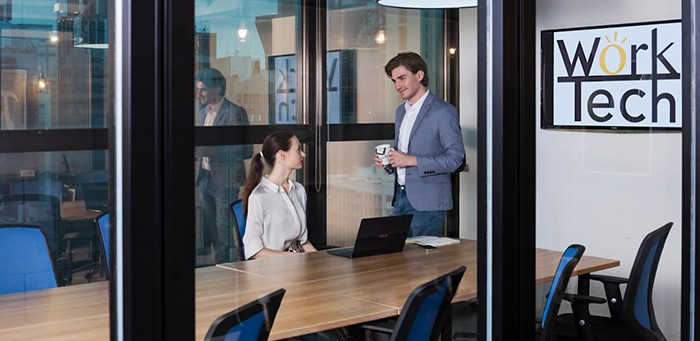
WorkTech’s location in Hong Kong’s Causeway Bay
WorkTech is set to launch its first co-working location in Taipei, a 2,000 square metre (21,528 square feet) space in the city’s hipster-favoured Zhongshan district that will open next month.
The eight-year-old Hong Kong-based company is the latest shared office provider to target the Taiwan capital, following an uptick in co-working operators leasing space in the city over the past eighteen months.
Just three weeks ago, WeWork announced the opening of an eight-floor space in the 18-storey Exchange Square Two in Taipei’s financial district of Xinyi, the US company’s first location in Taiwan.
In another indication of the market’s appeal, the UK’s IWG, the parent company of serviced-office giant Regus, sold a master franchise for its Taiwan business to Tokyo-based real estate company TKP Corporation last week valued at £22.7 million ($27 million).
Tapping into an Emerging Market
Natasha Ho, WorkTech’s chief strategy officer and head of global development, said that the office provider is optimistic about the potential of the Taipei market to grow over the coming years.
“The city’s shared office market benefits from Taipei’s thriving tech sector, which is supported by the Taiwan government and corporates,” Ho said, adding that Taipei is the perfect incubation hub for startups, which look to co-working spaces because of their low-cost and flexibility.

Natasha Ho, WorkTech’s chief strategy officer and head of global development, sees potential in the Taiwan market
The city’s 24 flexible workspaces is the lowest number among Asia Pacific’s major cities, making up only two percent of the overall office space in Taipei, according to Colliers.
Office take-up by co-working operators last year amounted to 150,000 square feet, while this year the property services firm predicts that co-working companies will lease 350,000 square feet.
Adding Taipei to a Hong Kong Portfolio
WorkTech’s centre in Taipei is its newest addition to a portfolio that includes 200,000 square feet of floor space in Hong Kong and 60,000 square feet in Shanghai, which serves a member base of 3,000.
Founded in 2011 by Hong Kong investor Michael Wong and operated by local co-working specialist Hansen Group, which also runs the co-living brand InnTech, WorkTech caters for a range of environments that the company says foster innovation and collaboration, from more relaxed free-seating creative-friendly settings to traditional corporate environments.
Ho said WorkTech differentiates itself from other operators through the value-added services and business connections that members get, with access to training and support services that include industry exchange activities, friendship programmes and investment matching meetings and workshops.
The 2,000 square metre WorkTech venue in Taipei, currently undergoing the final stages of renovations, is located on Jianguo North Road, a major north-south arterial route through the city.
A ten minute walk from Xingtian Temple metro station, the location is just under two kilometres from Hong Kong-headquartered rival Kafnu’s co-working space on Ming Sheng East Road, while Taipei’s financial centre, Xinyi, is accessible by metro in 40 minutes.
Tech Drives Demand for Flexible Space
Although prices have not yet been set, Ho said that the Taipei centre will match industry rates accordingly, with desks expected to be filled by local and international startups from Taiwan’s various incubators, as well as multinational companies.
At WeWork’s Exchange Square Two space, monthly rent for private offices starts at NT$40,700 ($1,311) per month, while hot desks go for NT$11,900.
This compares with an average desk cost in co-working centres in Taipei of $414 per month, while the average rent for grade A office space in the city is $33 per square foot per annum, according to Colliers.
“The demand for co-working space in Taipei is being driven by the growth of gaming, fintech and pharmaceutical startups, amongst others, which prefer high quality office space but find the unit size of grade A offices too large,” according to Erin Ting, a director of research at Savills in Taipei.
The Savills analyst said that the shortage of high quality offices in the city is also a factor that drives international companies to opt for co-working space, which is usually located in grade A buildings in prime locations.
Leave a Reply